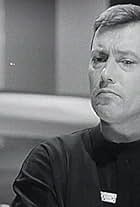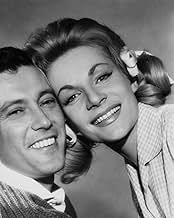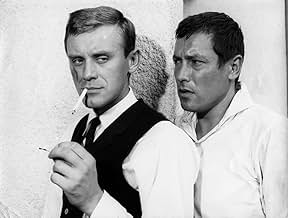Dietmar Schönherr(1926-2014)
- Actor
- Director
- Writer
After the annexation of Austria by the National Socialist regime under Adolf Hitler (1938), the family moved to Potsdam. In 1943, Schönherr passed his Abitur in the Brandenburg residential city. He came into contact with the world of film while still at school. He trained as an actor in Berlin and appeared in front of the camera for the first time in test recordings and in smaller roles.
After his military service from 1944 to 1945, Schönherr returned to Austria, where he began studying architecture in Innsbruck in 1946. However, just a year later he stopped his studies because he was offered a role in the film "Winter Melody". In 1947, Schönherr joined the Austrian Broadcasting Corporation, where he worked as a director, speaker and editor until 1952. At the same time, in 1951 he began an intensive acting career on stage and in film, where he had his first major success in 1955 with the film "Shrove Monday" and was successively seen in more than 70 film roles.
Schönherr dubbed the American actor James Dean in his three major roles: "Beyond Eden", "...because they don't know what they are doing" and "Giants". Schönherr was also seen in international productions, such as "Thomas Crown" alongside Steve McQueen or "Them Not Forgiven". Schönherr gained great popularity with German-speaking television audiences through his participation in the science fiction series "Raumpatrouille" in the role of Commander McLane.
He is also unforgettable to an audience of millions through his moderation of the ZDF quiz show "Wünsch Dir was" from 1970 to 1972. However, Schönherr made his most significant contribution to the development of German television culture through his format "The later the evening": The ARD series, which was broadcast in 22 episodes from 1973 to 1974, was the first to introduce the talk show to the Federal Republic based on the model of US television. In the 1980s, Schönherr demonstrated intensive political commitment to the international peace movement and against the rearmament plans of the US administration under Ronald Reagan.
His participation in demonstrations and his outspoken political statements cost him a lot of sympathy and also some professional television perspectives, but they also strengthened his reputation among the critical public. Despite his numerous political initiatives, Schönherr never turned his back on the world of stage and film. In 1998 he played a role in the German cinema production "Am I Beautiful?" by Doris Dörrie and in 2002 he was seen in German cinemas as the lawyer Herz in "Leo and Claire" (directed by Joseph Vilsmaier).
In September 2002, the actor shone in one of the leading roles in the ARD comedy "The Rose Warriors". Dietmar Schönherr has been awarded several prizes. In 1976 he received the "Golden Camera" from "HörZu". In 1999 he was honored with the "Heinz Galinski Prize" for his political work. As part of the "German Television Prize" in October 2005, Dietmar Schönherr was awarded the donor's honorary award. In the same year he was also awarded the "Change the World Award" by the "Club of Budapest".
Dietmar Schönherr was married to the Danish actress Vivi Bach for the second time in 1965. He died on July 18, 2014.
After his military service from 1944 to 1945, Schönherr returned to Austria, where he began studying architecture in Innsbruck in 1946. However, just a year later he stopped his studies because he was offered a role in the film "Winter Melody". In 1947, Schönherr joined the Austrian Broadcasting Corporation, where he worked as a director, speaker and editor until 1952. At the same time, in 1951 he began an intensive acting career on stage and in film, where he had his first major success in 1955 with the film "Shrove Monday" and was successively seen in more than 70 film roles.
Schönherr dubbed the American actor James Dean in his three major roles: "Beyond Eden", "...because they don't know what they are doing" and "Giants". Schönherr was also seen in international productions, such as "Thomas Crown" alongside Steve McQueen or "Them Not Forgiven". Schönherr gained great popularity with German-speaking television audiences through his participation in the science fiction series "Raumpatrouille" in the role of Commander McLane.
He is also unforgettable to an audience of millions through his moderation of the ZDF quiz show "Wünsch Dir was" from 1970 to 1972. However, Schönherr made his most significant contribution to the development of German television culture through his format "The later the evening": The ARD series, which was broadcast in 22 episodes from 1973 to 1974, was the first to introduce the talk show to the Federal Republic based on the model of US television. In the 1980s, Schönherr demonstrated intensive political commitment to the international peace movement and against the rearmament plans of the US administration under Ronald Reagan.
His participation in demonstrations and his outspoken political statements cost him a lot of sympathy and also some professional television perspectives, but they also strengthened his reputation among the critical public. Despite his numerous political initiatives, Schönherr never turned his back on the world of stage and film. In 1998 he played a role in the German cinema production "Am I Beautiful?" by Doris Dörrie and in 2002 he was seen in German cinemas as the lawyer Herz in "Leo and Claire" (directed by Joseph Vilsmaier).
In September 2002, the actor shone in one of the leading roles in the ARD comedy "The Rose Warriors". Dietmar Schönherr has been awarded several prizes. In 1976 he received the "Golden Camera" from "HörZu". In 1999 he was honored with the "Heinz Galinski Prize" for his political work. As part of the "German Television Prize" in October 2005, Dietmar Schönherr was awarded the donor's honorary award. In the same year he was also awarded the "Change the World Award" by the "Club of Budapest".
Dietmar Schönherr was married to the Danish actress Vivi Bach for the second time in 1965. He died on July 18, 2014.





















